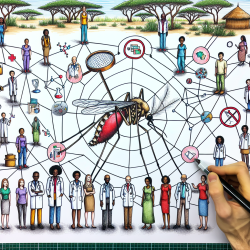Unveiling the Power of Social Networks in Malaria Elimination
In the quest for malaria elimination, Swaziland has made significant strides, yet the importation of malaria from neighboring Mozambique remains a critical challenge. A recent study, "Targeting imported malaria through social networks: a potential strategy for malaria elimination in Swaziland," sheds light on innovative strategies to tackle this issue by leveraging social networks.
Understanding the Challenge
Swaziland's battle against malaria has been commendable, reducing confirmed cases from 4,005 in 1999-2000 to 369 in 2011-2012. However, the importation of malaria from Mozambique, particularly during peak travel seasons, poses a significant threat to achieving complete elimination. The study highlights that most imported cases are linked to social networks of individuals with similar travel patterns.
Key Findings
The study conducted interviews with malaria surveillance agents, health providers, and individuals identified as imported malaria cases. It was discovered that:
- Most imported malaria cases were Mozambicans living in Swaziland, traveling frequently to Mozambique.
- Social networks of imported cases shared similar travel patterns, making them potential high-risk groups for malaria importation.
- Key congregation points, such as urban marketplaces and bus stations, were identified where these networks could be accessed for testing and treatment.
Implications for Practitioners
For practitioners, the study offers valuable insights into enhancing malaria control strategies:
- Proactive Screening: Implementing a proactive screening program targeting high-risk networks can help identify and treat malaria cases before onward transmission occurs.
- Utilizing Social Networks: Leveraging social networks for snowball sampling and time-location sampling can effectively reach and screen high-risk groups.
- Community Engagement: Engaging key informants and community leaders can facilitate access to networks and improve the effectiveness of interventions.
Encouraging Further Research
While the study provides a foundation, further research is needed to explore the full potential of social networks in malaria elimination. Practitioners are encouraged to investigate the effectiveness of these strategies in different contexts and refine them for broader application.
Conclusion
The study underscores the importance of innovative approaches in malaria elimination efforts. By harnessing the power of social networks, Swaziland can enhance its malaria control strategies and move closer to achieving its elimination goals.
To read the original research paper, please follow this link: Targeting imported malaria through social networks: a potential strategy for malaria elimination in Swaziland.










